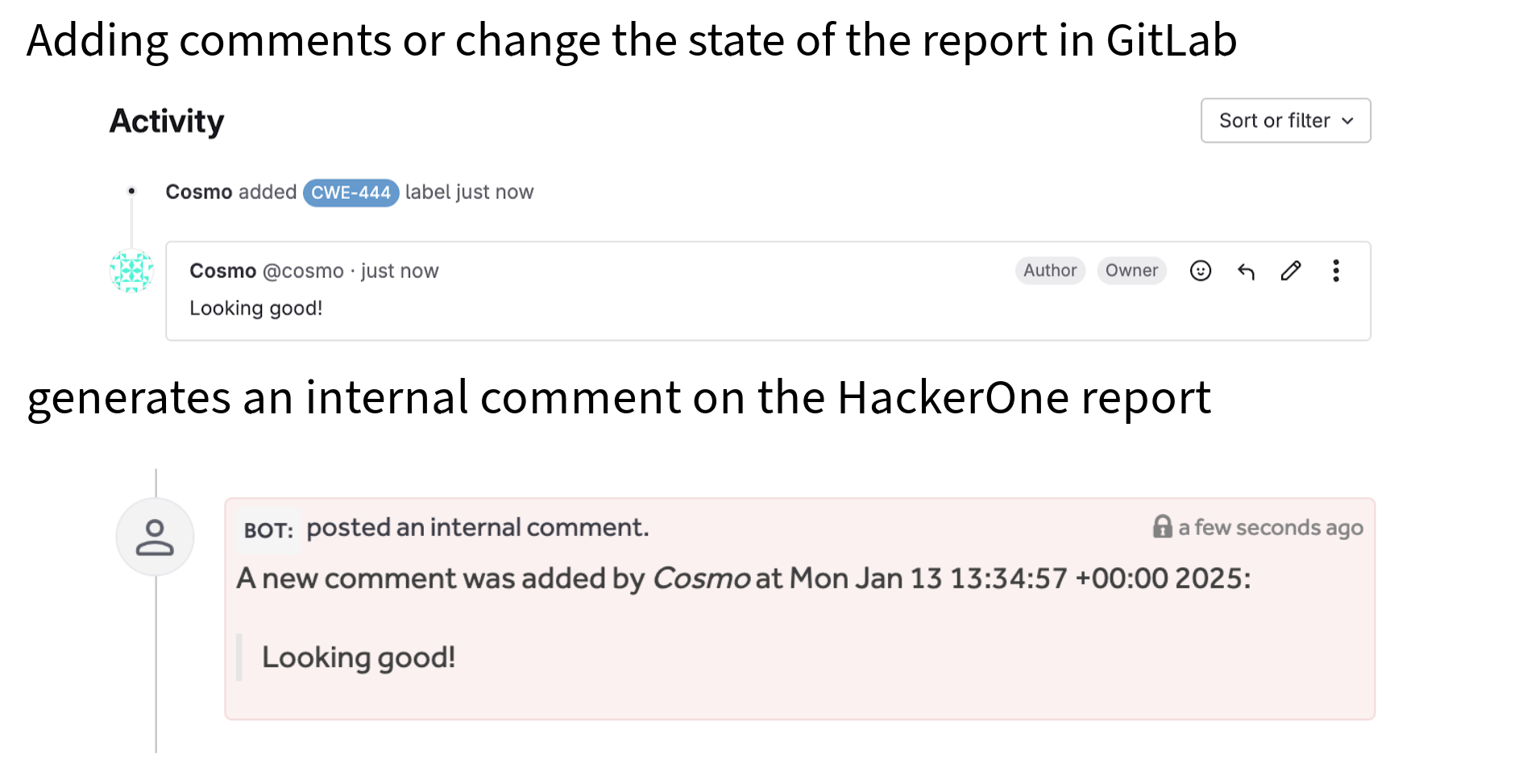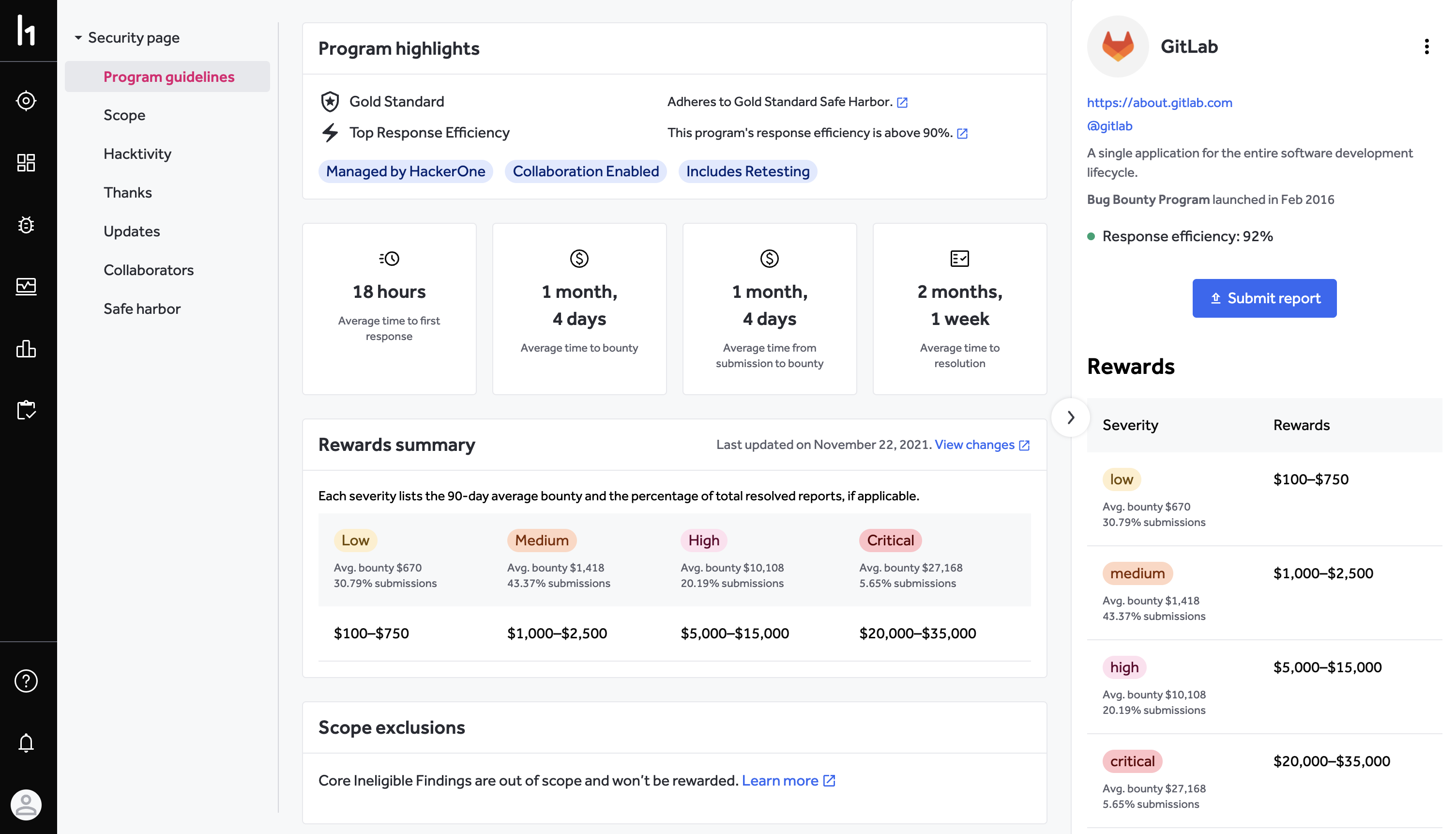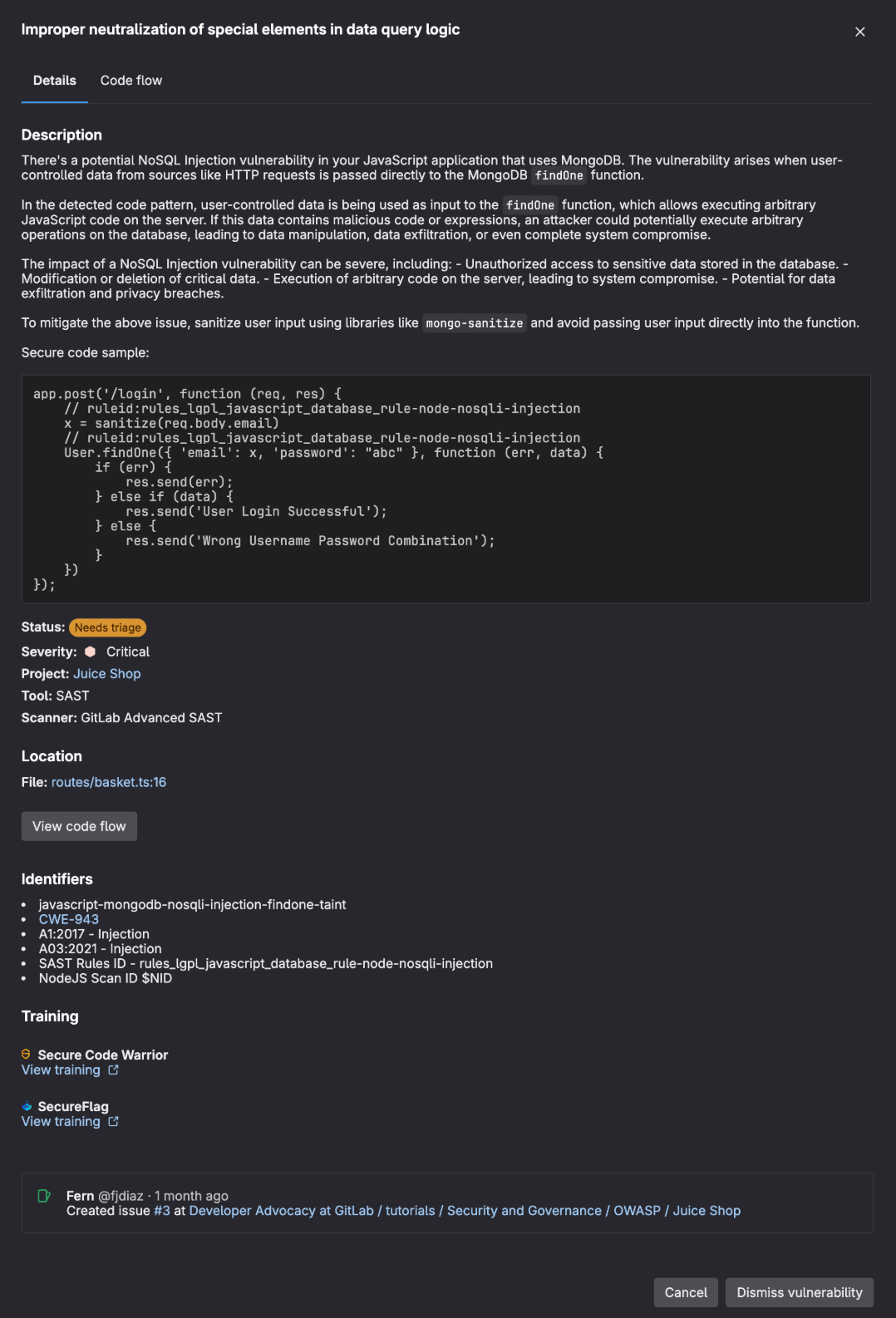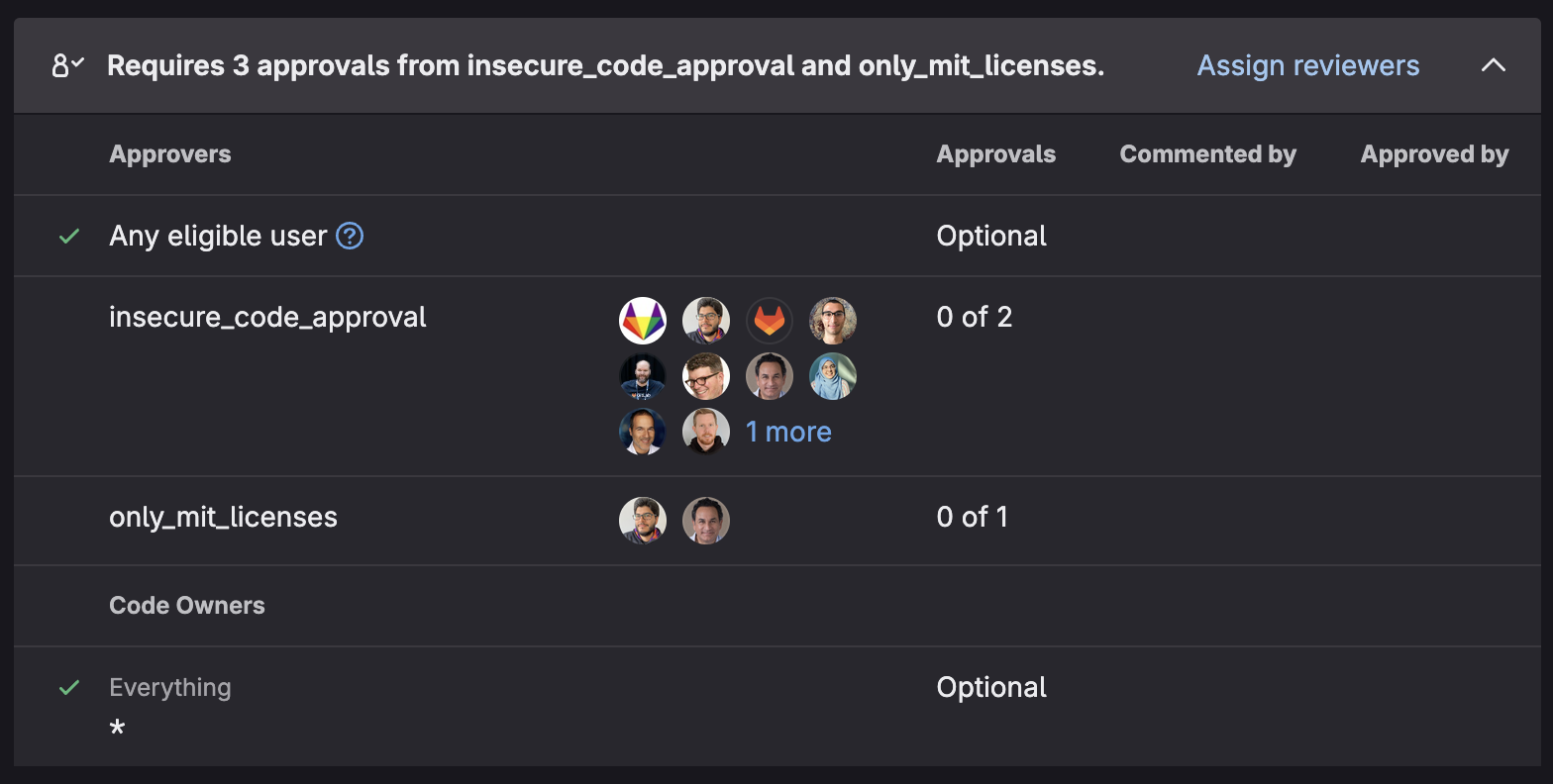Published on: April 3, 2025
6 min read
Enhance application security with GitLab + HackerOne
Learn about the GitLab + HackerOne partnership and how to easily implement an integration that improves your organization’s application security posture.

Security can no longer be an afterthought in the development process. Organizations need robust solutions that integrate security throughout the entire software development lifecycle. This is where the partnership between HackerOne and GitLab creates a compelling combination for modern application development teams.
GitLab, the comprehensive, AI-powered DevSecOps platform, and HackerOne, the leading crowd-sourced security platform, have established a partnership that brings together the best of both worlds: GitLab's streamlined DevSecOps workflow and HackerOne's powerful vulnerability management capabilities.
In this tutorial, you'll learn how to enhance developer productivity and your security posture by implementing HackerOne's GitLab integration.
An integration that empowers developers
HackerOne's GitLab integration is remarkably straightforward, yet powerful. When security researchers discover vulnerabilities through HackerOne's platform, these findings are automatically converted into GitLab issues. This creates a seamless workflow where:
- Security researchers identify vulnerabilities via HackerOne's platform
- Validated vulnerabilities are automatically converted into GitLab issues
- Development teams can address these issues directly within their existing workflow
- Resolution status is synchronized between both platforms
You can start leveraging the benefits of GitLab and HackerOne by using the integration to track GitLab issues as references on HackerOne. This integration provides bi-directional and seamless data syncing between your HackerOne report and GitLab issues, improving alignment between development and security teams while streamlining security vulnerability processing.
To configure the GitLab integration to sync information between your HackerOne report and your Gitlab issue, follow the instructions provided in HackerOne's GitLab integration documentation, which includes:
- Setting up an OAuth 2.0 application for your GitLab instance with the provided HackerOne settings
- Connecting HackerOne to the newly created OAuth 2.0 on GitLab
- Authorizing HackerOne to access the GitLab API
- Configuring which GitLab project you would like to escalate HackerOne reports to
- Selecting the HackerOne fields to map to corresponding GitLab fields
- GitLab-to-HackerOne and HackerOne-to-GitLab event configuration
Once the integration is in place, you’ll be able to seamlessly sync data bi-directionally between both GitLab and HackerOne. This helps simplify context-switching and allows vulnerabilities to be tracked with ease throughout both systems. The integration allows for the following features:
- Creating a GitLab Issue from HackerOne: You can create new GitLab issues for reports you receive on HackerOne.
- Linking HackerOne reports to existing GitLab tasks.
- Syncing updates from HackerOne to GitLab: The following updates on a report are synced as a comment to GitLab.
- Report comments
- State changes
- Rewards
- Assignee changes
- Public disclosure
- Close GitLab Issue
- Syncing Updates from GitLab to HackerOne: The following updates on GitLab will be reflected in HackerOne as an internal comment on the associated report:
- Comments
- State changes
- HackerOne severity to GitLab label mapping: Allows you to set a custom priority when escalating a report to GitLab.
- Due date mapping: Allows you to automatically set a custom due date based on the severity of a report.

These features improve alignment between development and security teams and streamlining security vulnerability processing. To learn more on how the integration works, see the integration documentation.
A look into HackerOne bug bounty programs
HackerOne provides bug bounty programs or cybersecurity initiatives where rewards are offered for discovering and reporting vulnerabilities in customers’ software systems, websites, or applications. Bug bounty programs help enhance the security of an application by:
- Identifying security flaws before malicious actors can exploit them
- Leveraging diverse expertise from a global community of security researchers
- Providing a cost-effective way to improve cybersecurity
- Complementing internal security efforts and traditional penetration testing
GitLab utilizes HackerOne’s bug bounty program, allowing security researchers to report vulnerabilities in GitLab applications or infrastructure. This crowdsourced approach helps GitLab identify and address potential security issues more effectively.

By leveraging HackerOne's platform and the global hacker community, organizations can significantly enhance their security posture, identify vulnerabilities faster, and stay ahead of potential threats.
Secure applications and improve efficiency with GitLab
GitLab provides a complete DevSecOps platform, which enables functionality for the complete software development lifecycle, including security and compliance tools. GitLab supports the following security scanner types:
- Static Application Security Testing (SAST)
- Dynamic Application Security Testing (DAST)
- Container Scanning
- Dependency Scanning
- Infrastructure as Code Scanning
- Coverage-guided Fuzzing
- Web API Fuzzing
With GitLab, you can add security scanning by simply applying a template to your CI/CD pipeline definition file. For example, enabling SAST just takes a few lines of code in the .gitlab-ci.yml:
stage:
- test
include:
- template: Jobs/SAST.gitlab-ci.yml
This will run SAST on the test stage, and auto-detect the languages used in your application. Then, whenever you create a merge request, SAST will detect the vulnerabilities in the diff between the feature branch and the target branch and provide relevant data on each vulnerability to assist with remediation.

The results of the SAST scanner can block code from being merged if security policies are applied. Native GitLab users can be set as approvers, allowing required reviews before merging insecure code. This assures that all vulnerabilities have oversight from the appropriate parties.

HackerOne has integrated GitLab into its operations and development processes in several significant ways, which have led to development process improvements and enhanced scalability and collaboration. These improvements include faster deployments and cross-team planning.
Key benefits of HackerOne's GitLab integration
The key benefits of using HackerOne and GitLab together include:
- Enhanced security visibility: Development teams gain immediate visibility into security vulnerabilities without leaving their primary workflow environment. This real-time awareness helps teams prioritize security issues alongside feature development.
- Streamlined remediation process: By converting HackerOne reports directly into GitLab issues, the remediation process becomes part of the standard development cycle. This eliminates context switching between platforms and ensures security fixes are tracked alongside other development work.
- Accelerated time to fix: The integration significantly reduces the time between vulnerability discovery and resolution. With HackerOne submissions immediately available in GitLab, development teams can begin working on fixes without delay, improving overall security posture.
- Improved collaboration: Security researchers, security teams, and developers can communicate more effectively through this integration. Comments and updates flow between both platforms, creating a collaborative environment focused on improving security.
- Real-world impact: Organizations implementing the HackerOne and GitLab integration have reported:
- Up to 70% reduction in time from vulnerability discovery to fix
- Improved developer satisfaction by keeping them in their preferred workflow
- Enhanced security visibility across the organization
- More effective allocation of security resources
To get started today, visit the integration setup page today.
Learn more
To learn more about GitLab and HackerOne, and how we can help enhance your security posture, check out the following resources:
